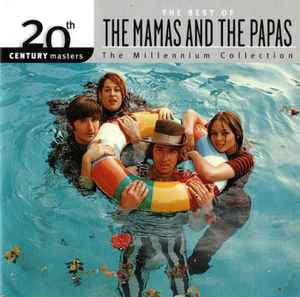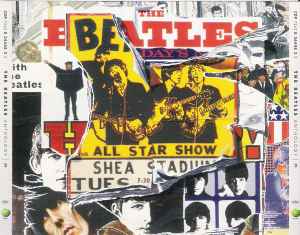The Temptations – The Best Of The Temptations Volume 1 - The '60s
| Label: | Motown – 012 153 362-2 |
|---|---|
| Series: | 20th Century Masters The Millennium Collection |
| Format: | CD, Compilation, Remastered |
| Country: | US |
| Released: | |
| Genre: | Funk / Soul |
| Style: | Rhythm & Blues |
Tracklist
| 1 | The Temptations– | My Girl | 2:42 |
| 2 | The Temptations– | The Way You Do The Things You Do | 2:39 |
| 3 | The Temptations– | Beauty Is Only Skin Deep | 2:21 |
| 4 | The Temptations– | Get Ready | 2:37 |
| 5 | The Temptations– | Ain't Too Proud To Beg | 2:31 |
| 6 | The Temptations– | You're My Everything | 2:55 |
| 7 | The Temptations With Diana Ross & The Supremes*– | I'm Gonna Make You Love Me | 3:06 |
| 8 | The Temptations– | Cloud Nine | 3:28 |
| 9 | The Temptations– | (I Know) I'm Losing You | 2:27 |
| 10 | The Temptations– | I Wish It Would Rain | 2:47 |
| 11 | The Temptations– | I Can't Get Next To You | 2:51 |
Companies, etc.
- Phonographic Copyright ℗ – Motown Record Company, L.P.
- Copyright © – Motown Record Company, L.P.
- Manufactured By – Motown Record Company, L.P.
- Distributed By – Universal Music & Video Distribution, Inc.
- Remastered At – Universal Music Studios East, NYC
- Made By – UML
Credits
- Compilation Producer – Harry Weinger
- Mastered By [Digitally Remastered By] – Kevin Reeves, Suha Gur
- Photography By – Motown Archives
Notes
All songs previously on the Gordy label
Barcode and Other Identifiers
- Barcode: 6 01215 33622 1
- Matrix / Runout: 012 153 3622 01$
- Mastering SID Code: IFPI L009
- Mould SID Code (Variant 1): IFPI 0338
- Mould SID Code (Variant 2): IFPI 0314
- Other (Inner Hub Stamp): MADE IN USA BY UML
Other Versions (5 of 8)
View All| Title (Format) | Label | Cat# | Country | Year | |||
|---|---|---|---|---|---|---|---|
| The Best Of The Temptations Volume 1 - The '60s (CD, Compilation, Remastered) | Motown | 0121533622 | Canada | 1999 | |||
New Submission | The Best Of The Temptations Volume 1 - The '60s (Cassette, Compilation, Remastered) | Motown | 012 153 362-4 | US | 1999 | ||
New Submission | The Best Of The Temptations Volume 1 - The '60s (Cassette, Compilation, Remastered) | Motown | 012 153 362-4 | Canada | 1999 | ||
New Submission | The Best Of The Temptations Volume 1 - The '60s (CD, Compilation, Remastered) | Motown | 012 153 362-2 | US | 1999 | ||
New Submission | The Best Of The Temptations (Volume 1 The '60s) (CD, Compilation, Reissue, Remastered, Digipak) | Motown | B0007726-02 | US | Unknown |
Recommendations
- Released2002 — USCD —Album
- Released1995 — USCD —Album, Stereo, Mono
- Released2000 — USCD —Compilation, Remastered, Stereo, Mono
- Released1991 — USCD —Album
- Released1993 — USCD —Compilation, Remastered
- Released1999 — USCD —Album
- CD —Compilation, Remastered, Repress
- Released1999 — USCD —Compilation, Remastered
- Released1992 — USCD —Compilation
- Released1996 — USCD —Album, Stereo, Mono
Reviews
 The Temptations are another of Motown’s very best male acts. Like all of 20th Century Masters compilations, this offers a small selection of the group’s hit singles, each one being widely revered. As a sampler to the uninitiated, the compilation here will serve you well. So, let’s take a look at the track line-up:
The Temptations are another of Motown’s very best male acts. Like all of 20th Century Masters compilations, this offers a small selection of the group’s hit singles, each one being widely revered. As a sampler to the uninitiated, the compilation here will serve you well. So, let’s take a look at the track line-up:
MY GIRL
This landmark Temptations classic was a shrewdly conceived updating of Mary Wells' My Guy, also penned by Smokey Robinson. Smokey has, on numerous occasions, stated that the song was tailor-made to fit the rough and ready vocal style of David Ruffin, although at that point in time Ruffin wasn't considered the lead singer in the group. Contradicting this statement are Ruffin's claims that the song was written for his daughter, while Claudette Robinson (Smokey's then-wife) having gone on record saying it was intended for her. Needless to say, the results are utterly thrilling. Smokey tutoured The Temptations through their vocal parts including the terrific vocal trade-offs on the track's chorus, where each member in turn sings the title. Beautifully orchestrated, including swirling strings and James Jamerson's bass licks, My Girl proudly topped both the American pop and R&B charts, and has since gone on to be one of Motown's most famous classics.
THE WAY YOU DO THE THINGS YOU DO
Written by one of Motown's most prolific songwriters and producers Smokey Robinson, The Temptations had endured a series of line-ups by the time The Way You Do The Things You Do was released in 1964. Signed to Motown in 1961, the group had evolved from earlier groups The Distants, whose members included Otis Williams and Melvin Franklin, and The Primes, which featured Otis Williams and Eddie Kendricks. The most famous line-up of The Temptations became complete in 1963 with David Ruffin replacing Elbridge Bryant following a backstage violent encounter with Paul Williams. This single was their seventh American single, and first-ever in the UK. With playful lyrics, the track boasts a seductive allure which is complemented by Eddie Kendricks' sensual falsetto. The arrangement is bouncy and contagious, bearing that familiar, classic Motown sound, yet also establishing and shaping the group's sound. After years of struggling commercially, the group had finally made it with this breakthrough, the single climbing to #11 on Billboard's Hot 100 while flying all the way to the top on the R&B chart.
BEAUTY IS ONLY SKIN DEEP
This further collaboration with Norman Whitfield in 1966 had first been offered to, and rejected by, Jimmy Ruffin (brother of David). The track dates back to April 1964, initially prepared for The Temptations, but the backing track ended up going to The Miracles, although their version wouldn't surface until 1966. The Temptations finally completed the recording on 11 May 1966, and captures a superb contribution from Motown's in-house band, the Funk Brothers, featuring James Jamerson's prominent, strident bass playing, Richard “Pistol” Allen and Uriel Jones on drumming, and congas led by Eddie “Bongo” Brown. The song departs from a sense of self-deprecation apparent on some of their previous songs, here holding an optimistic air of generosity. The narrator is accepting his partner warts-and-all, stressing personality over aesthetic, especially on churlish lines like “A pretty face you may not possess”. David Ruffin leads the track, his sharp vocal peaks at moments seeming unstable and a little out of tune with the arrangement at points, though he quickly recovers form in the second-half. Lifted in the summer of '66, Beauty Is Only Skin Deep saw the group top the American soul chart again, plus hitting #3 pop and #18 in Britain.
GET READY
This jamming classic has been described by its writer and producer, Smokey Robinson, as his most direct song. The galloping verses led by Eddie Kendricks' smooth falsetto tenor, roll into the chorus, where the sharp harmonies of Otis Williams, David Ruffin, Melvin Franklin and Paul Williams shine out like a ray of sunshine. It's surprising this infectious belter only dented the pop top thirty as it's since grown to be one of Motown's most recognisable recordings. A timeless party classic and still a guaranteed dance-floor filler!
AIN’T TOO PROUD TO BEG
The compilation jumps forward to this early 1966 release, and one that is also among my favourites. Norman Whitfield stepped forward to write and produce Ain't Too Proud To Beg (co-written by Eddie Holland) which saw him reinstall David Ruffin as the lead singer. Ruffin gives everything he's got here, boasting a famously husky performance which became this recording's trademark. Apparently the track was deliberately pitched almost beyond reach to get maximum vocal power from Ruffin, leading to him pouring with sweat with Otis Williams and Whitfield goading him from the sanctuary of the control booth. It certainly worked, Ruffin's vocal providing an air wild indiscipline. Simultaneously tough and vulnerable, this is a vivid and sharp creation, neatly laid out with each individual instrument mixed to cut through. The bass guitar is sent high across the grooving rhythm, while brass notes fluctuate behind Ruffin's pleading vocals. Now one of their best-loved singles, Ain't Too Proud To Beg catapulted to the top of the American soul chart, while reaching #13 on the Hot 100 and #21 in the UK.
YOU’RE MY EVERYTHING
This was probably the most free-flowing Temptations single up to that point, with a light, summery pop feel. Eddie Kendricks’ sensual falsetto takes centre stage, something that annoyed the group’s main lead singer, David Ruffin, who saw himself as the driving force of the Tempations. Co-composed by Smokey Robinson and produced by Norman Whitfield, the single was able to manage a British top thirty placing, while jumping into the American pop and R&B top ten charts.
I’M GONNA MAKE YOU LOVE ME (with DIANA ROSS & THE SUPREMES
After I’m Gonna Make You Love Me proved so popular with DJs who were sent advanced copies of the album Diana Ross & The Supremes Join The Temptations, it was extracted as the first single from the project. Written by the Philadelphia-based team, Kenneth Gamble, Leon Huff and Jerry Ross, the song had first been a moderate hit for Dee Dee Warwick before later being offered to Dusty Springfield, who, instead of recording it herself, passed it over to Madeline Bell.
The splitting of lead duties between Diana’s lush and solemn delivery and Eddie Kendricks’ sensual falsetto made for an explosive and sizzling combination. Despite the singers gelling seamlessly, Diana had recorded her supple vocals in Los Angeles under the guidance of producer Frank Wilson while Nick Ashford oversaw Eddie’s contribution in Detroit.
The contagious arrangement, courtesy of Paul Riser, was bubbling with distinctive Motown sounds that included strings and horns and a striking bassline played by James Jamerson on the track’s intro which had been lifted from Jimmy Ruffin’s What Becomes Of The Broken Hearted. Near the bridge of the song, Diana and Otis Williams trade a brief but vibrant spoken interlude, and it was all these magical ingredients that made the song an instant smash hit. Flying to #2 on both the American pop and R&B charts, it then made it all the way to the top on Cash Box and Record World. The single, with A Place In The Sun as the B-side, was rapidly certified platinum and also went on to enjoy success in Britain, where both groups were doing very well at that stage, climbing to #3 on the mainstream chart.
CLOUD NINE
With The Temptations having parted ways with David Ruffin, the group sought a replacement which they found in Dennis Edwards, formerly of The Contours. In the second half of 1968 the group switched to a new sound when they collaborated with producer Norman Whitfield. Major black artists like James Brown, Curtis Mayfield and George Clinton were all working on different fronts in the development of what later would be known as the ‘blaxploitation’ field. Like many of the major artists at Motown, The Temptations were in need of redefining themselves.
In 1968 Sly & the Family Stone scored a hit with ‘Dance To The Music’. Loved by Otis Williams, he introduced producer Norman Whitfield to the song. Whitfield was initially reluctant to produce something so radically different but this soon changed when he cradted the psychedelic-style Cloud Nine. Driven by a harder beat, complemented by wah-wah guitars and Cuban percussionist Mongo Santamaria on conga drums, each of The Temptations trade leads on the verses, bridges and chorus. Here you get to really appreciate the contrasting sounds of each of the singers, from Dennis Edwards’ gravelly, dominating vocals, to the trade-offs featuring Paul Williams and Eddie Kendricks.
The lyrical content of Cloud Nine depicts the poverty-stricken, ghettoised narrator describing the hardships of life in the real world, ‘needing something to ease his troubled mind’. The song analyses society as a self-centered battle for survival, an escape to ‘Cloud Nine’ providing a welcome relief from reality and ‘every man is free’. Lyricist Barrett Strong always denied allegations that the lyric references drug-use and Otis Williams once later commented, “We were talking about just a state of mind…but fans thought we were talking about drugs, and we weren’t”.
Scoring The Temptations one of their biggest-hit singles, Cloud Nine, as well as marking the first single to feature newly-appointed lead singer, Dennis Edwards, also garnered Motown its first Grammy award in 1969.
(I KNOW) I’M LOSING YOU
This song had drawn inspiration from George Clinton's (I Wanna) Testify and was commenced by Cornelius Grant and bassist Bill Upchurch. Their studio jam was overheard by Norman Whitfield who took immediate interest and proceeded to take the basic riff (which forms the song's introduction) to his writing partner. From there, they crafted the sharply articulate and wrought verses and was recorded with prominent sonics, where Grant's creeping guitar intro is met with the ominous thrum of bass further adding to the intensity. Heavy on bass, Earl Van Dyke's piano is pushed against deep, pressurised brass saturated in reverb. David Ruffin's lead vocal perfectly suits his rough-and-ready style, brilliantly conveying the despair caught in the helpless torment of knowing his woman is being unfaithful to him. Lifted in late 1966, the single quickly jumped into the US Billboard top ten, whilst gearing into pole position on the R&B chart. It wasn't quite as well-received in the UK where it merely dented the top twenty.
I WISH IT WOULD RAIN
Here is a song which was modelled on Carole King’s Crying In The Rain, a track which saw the The Everly Brothers enjoy a hit version with in 1962, I Wish It Would Rain speaks of the misery and torment endured when yearning for a lost love to return, using inclemency as a literal mask for one’s tears. The emotion running through the narrative is authentic, having been based on co-writer Roger Penzabene’s true tale of his wife leaving him. Evidently still feeling in complete despair, Penzabene would break down in tears during the recording sessions. Even sadder is that he would commit suicide after the track had been recorded.
Producer Norman Whitfield sporadically drops seagull and ocean sound effects into the mix, and the track became one of The Temptations’ most praised track, thanks to an exhilarating range of vocals and magnificent production. Though failing to chart commercially in the UK, I Wish It Would Rain went top five pop in the US, while firing all the way to #1 on the R&B chart.
I CAN’T GET NEXT TO YOU
Released as the trailer single for the Norman Whitfield-produced Puzzle People album, rapidly topped both the pop and soul charts in America. Introduced with sound-effects, the track features the group having fun with honky-tonk piano and an array of falsetto “oohs” adding to the celebratory mood. Continuing the formula of Cloud Nine, I Can’t Get Next To You is substantial in its own right; a true sonic delight and closing a brief but brilliant all-round compilation here.
Ian Phillips
Release
For sale on Discogs
Sell a copy52 copies from $0.99










